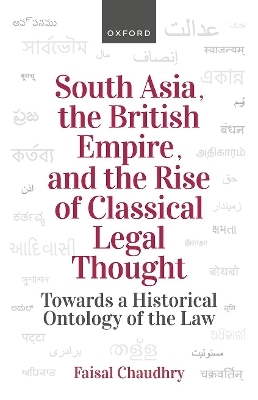
South Asia, the British Empire, and the Rise of Classical Legal Thought
Toward a Historical Ontology of the Law
Seiten
2024
Oxford University Press (Verlag)
978-0-19-891648-2 (ISBN)
Oxford University Press (Verlag)
978-0-19-891648-2 (ISBN)
The book delves into colonial South Asia's legal transformation under the rule of the British Crown, examining shifts in sovereignty, land control, and justice influenced by classical legal thought. It explores two key discourses, doctrinal and ordinary language, shaping the concept of 'the law.'
This book considers the legal history of colonial rule in South Asia from 1757 to the early 20th century. It traces a shift in the conceptualization of sovereignty, land control, and adjudicatory rectification, arguing that under the East India Company the focus was on 'the laws' factoring into the administration of justice more than 'the law' as an infinitely generative norm system. This accompanied a discourse about rendering property 'absolute' defined in terms
of a certainty of controlling land's rent-and made administrable mainly as a duty of revenue paymentDLrather than any right of ostensibly physical dominion. Leaving property external to its ontology of
'the laws,' the Company's regime thus differed significantly from its counterparts in the Anglo-common-law mainstream, where an ostensibly unitary, physical, and disaggregable notion of the property right was becoming a stand in for a notion of legal right in general already by the late 18th century. Only after 1858, under Crown rule, did conditions in the subcontinent ripen for 'the law' to emerge as a purportedly free-standing institutional fact. A key but neglected factor in this
transformation was the rise of classical legal thought, which finally enabled property's internalization into 'the law' and underwrote status and contract becoming the other key elements of the Raj's new legal
ontology. Formulating a historical ontological approach to jurisprudence, the book deploys a running distinction between the doctrinal discourse of (the) law and ordinary-language discourse about (the) law that carries implications for legal theory well beyond South Asia.
This book considers the legal history of colonial rule in South Asia from 1757 to the early 20th century. It traces a shift in the conceptualization of sovereignty, land control, and adjudicatory rectification, arguing that under the East India Company the focus was on 'the laws' factoring into the administration of justice more than 'the law' as an infinitely generative norm system. This accompanied a discourse about rendering property 'absolute' defined in terms
of a certainty of controlling land's rent-and made administrable mainly as a duty of revenue paymentDLrather than any right of ostensibly physical dominion. Leaving property external to its ontology of
'the laws,' the Company's regime thus differed significantly from its counterparts in the Anglo-common-law mainstream, where an ostensibly unitary, physical, and disaggregable notion of the property right was becoming a stand in for a notion of legal right in general already by the late 18th century. Only after 1858, under Crown rule, did conditions in the subcontinent ripen for 'the law' to emerge as a purportedly free-standing institutional fact. A key but neglected factor in this
transformation was the rise of classical legal thought, which finally enabled property's internalization into 'the law' and underwrote status and contract becoming the other key elements of the Raj's new legal
ontology. Formulating a historical ontological approach to jurisprudence, the book deploys a running distinction between the doctrinal discourse of (the) law and ordinary-language discourse about (the) law that carries implications for legal theory well beyond South Asia.
Faisal Chaudhry is an Assistant Professor at the University of Massachusetts School of Law. He also holds a concurrent appointment in the Department of History as well. His academic background includes positions at the University of Dayton and the University of Pennsylvania. Chaudhry's historical research centres on the interplay between law, empire, and political economy in South Asia, with a focus on the historical convergence of legal and economic concepts. In his contemporary scholarship, he examines the role of law in supporting markets and the complex impact of property rights institutions on our overall well-being.
Introduction
Section One: The Legal History of Colonial Rule in the South Asian Subcontinent and the Ontologization of
| Erscheinungsdatum | 27.01.2024 |
|---|---|
| Verlagsort | Oxford |
| Sprache | englisch |
| Gewicht | 1 g |
| Themenwelt | Geschichte ► Teilgebiete der Geschichte ► Kulturgeschichte |
| Geschichte ► Teilgebiete der Geschichte ► Militärgeschichte | |
| Geschichte ► Teilgebiete der Geschichte ► Wirtschaftsgeschichte | |
| Recht / Steuern ► Rechtsgeschichte | |
| ISBN-10 | 0-19-891648-5 / 0198916485 |
| ISBN-13 | 978-0-19-891648-2 / 9780198916482 |
| Zustand | Neuware |
| Haben Sie eine Frage zum Produkt? |
Mehr entdecken
aus dem Bereich
aus dem Bereich
der stille Abschied vom bäuerlichen Leben in Deutschland
Buch | Hardcover (2023)
C.H.Beck (Verlag)
23,00 €
vom Mittelalter bis zur Gegenwart
Buch | Softcover (2024)
C.H.Beck (Verlag)
12,00 €
Die Revolution des Gemeinen Mannes
Buch | Softcover (2024)
C.H.Beck (Verlag)
12,00 €


